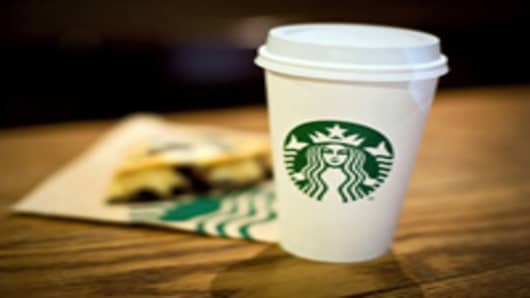Coffee retailer Starbucks eported quarterly earnings that topped nalysts' expectations by a penny and announced that it would hike its dividend by 24 percent on Thursday.
After the earnings announcement, the company's shares rose more than 6 percent in trading after the closing bell. (Click here to get the latest quotes for Starbucks.)
The world's biggest coffee chain's net income was $359 million, or 46 cents per share, for the fiscal fourth-quarter ended Sept. 30, slightly up from $358.5 million, or 47 cents per share a year earlier.
Excluding gains that included the sale of corporate real estate, the company posted fiscal fourth-quarter earnings of 46 cents per share, up from 37 cents a share in the year-earlier period.
Revenue increased 11 percent to $3.36 billion from $3.03 billion a year ago.
Analysts had expected the company to report earnings excluding items of 45 cents a share on $3.38 billion in revenue, according to a consensus estimate from Thomson Reuters.
The company raised its full-year 2013 outlook to a range of $2.06 to $2.15 per share. This midpoint fell short of analysts' estimates of $2.13 a share.
In its release, the company also announced plans to raise its quarterly dividend by 24 percent to 21 cents form 17 cents.
"We're going to open up to close to 1,300 new stores next year," said Starbucks CEO Howard Schultz on CNBC's "Closing Bell.""Seventy to 80 percent of growth will come from outside of North America, mainly Asia."
Schultz added that the company is beginning to see a slight improvement in Western Europe.
Global sales at stores open at least 13 months rose 6 percent, helped by a 5 percent increase in traffic and a 1 percent rise in average spending per visit. That topped the 4.97 percent rise analysts polled by Consensus Metrix had expected. Meanwhile, comparable store sales increased 7 percent in the Americas region.
The results were in contrast to others in the restaurant industry, including McDonald's, which have largely been a string of disappointments and diminishing expectations as some of the sector's top performers grapple with the still weak economy and increasing competition from resurgent rivals.


